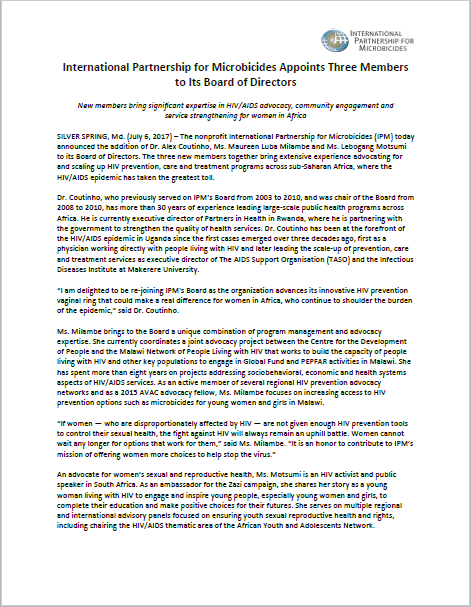International Partnership for Microbicides Appoints Three Members to Its Board of Directors
New members bring significant expertise in HIV/AIDS advocacy, community engagement and service strengthening for women in Africa
SILVER SPRING, Md. (July 6, 2017) – The nonprofit International Partnership for Microbicides (IPM) today announced the addition of Dr. Alex Coutinho, Ms. Maureen Luba Milambe and Ms. Lebogang Motsumi to its Board of Directors. The three new members together bring extensive experience advocating for and scaling up HIV prevention, care and treatment programs across sub-Saharan Africa, where the HIV/AIDS epidemic has taken the greatest toll.
Dr. Coutinho, who previously served on IPM’s Board from 2003 to 2010, and was chair of the Board from 2008 to 2010, has more than 30 years of experience leading large-scale public health programs across Africa. He is currently executive director of Partners in Health in Rwanda, where he is partnering with the government to strengthen the quality of health services. Dr. Coutinho has been at the forefront of the HIV/AIDS epidemic in Uganda since the first cases emerged over three decades ago, first as a physician working directly with people living with HIV and later leading the scale-up of prevention, care and treatment services as executive director of The AIDS Support Organisation (TASO) and the Infectious Diseases Institute at Makerere University.
“I am delighted to be re-joining IPM's Board as the organization advances its innovative HIV prevention vaginal ring that could make a real difference for women in Africa, who continue to shoulder the burden of the epidemic,” said Dr. Coutinho.
Ms. Milambe brings to the Board a unique combination of program management and advocacy expertise. She currently coordinates a joint advocacy project between the Centre for the Development of People and the Malawi Network of People Living with HIV that works to build the capacity of people living with HIV and other key populations to engage in Global Fund and PEPFAR activities in Malawi. She has spent more than eight years on projects addressing sociobehavioral, economic and health systems aspects of HIV/AIDS services. As an active member of several regional HIV prevention advocacy networks and as a 2015 AVAC advocacy fellow, Ms. Milambe focuses on increasing access to HIV prevention options such as microbicides for young women and girls in Malawi.
“If women — who are disproportionately affected by HIV — are not given enough HIV prevention tools to control their sexual health, the fight against HIV will always remain an uphill battle. Women cannot wait any longer for options that work for them,” said Ms. Milambe. “It is an honor to contribute to IPM’s mission of offering women more choices to help stop the virus.”
An advocate for women’s sexual and reproductive health, Ms. Motsumi is an HIV activist and public speaker in South Africa. As an ambassador for the Zazi campaign, she shares her story as a young woman living with HIV to engage and inspire young people, especially young women and girls, to complete their education and make positive choices for their futures. She serves on multiple regional and international advisory panels focused on ensuring youth sexual reproductive health and rights, including chairing the HIV/AIDS thematic area of the African Youth and Adolescents Network.
“One of the most important actions we can take is providing young people with a set of HIV prevention interventions, from education and access to testing to youth- and women-centered products and services,” said Ms. Motsumi. “I am excited to support IPM to empower young women in South Africa and beyond to take control of their health.”
IPM is currently preparing regulatory applications for its monthly dapivirine ring, which last year was found in two Phase III clinical trials to safely reduce the risk of HIV in women. The ring, which women insert and remove themselves, slowly releases an antiretroviral drug called dapivirine over the course of one month. If approved, the product would become the first long-acting prevention method for women. Additional open-label studies are under way that are providing the ring to former Phase III trial participants and young women who have not yet used the product, and collecting important information on potential barriers to ring use and strategies to overcome them.
“The first-hand experience of our newest board members in supporting women and communities to access diverse HIV/AIDS tools and services will be invaluable as we plan for the future,” said Dr. Zeda Rosenberg, founder and CEO of IPM. “We are thrilled to have their insights and support as we work to expand women’s HIV prevention options.”
Next-generation products in IPM’s pipeline include a longer-acting three-month dapivirine ring that would reduce long-term costs and offer added convenience as well as a three-month multipurpose prevention ring that provides protection against both HIV and unintended pregnancy. IPM is also developing new products that that would combine the potency of different antiretroviral drugs.
About IPM: IPM is a nonprofit organization that developed the monthly dapivirine vaginal ring, and is dedicated to developing other new HIV prevention tools and sexual and reproductive health technologies for women, and making them available in developing countries. Our partnerships with public, private and civil society bring scientific ingenuity, political will and financial resources to bear on developing and delivering products designed to have significant public health impact. IPM has offices in South Africa, the United States and Belgium. Please visit www.IPMglobal.org.
Contacts:
IPM Global: Holly Seltzer, hseltzer@IPMglobal.org, +1.301.608.4277
IPM Africa: Leonard Solai, lsolai@IPMglobal.org, +27.84.660.6776
